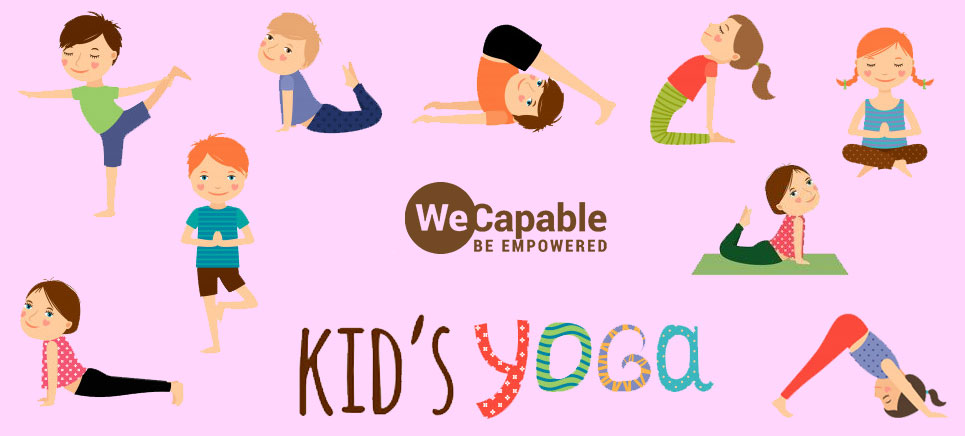Parenting is never a cakewalk. And, being parents to a child with special needs comes with some unique set of challenges. This makes parents feel that they need some extra special knowledge for parenting their special needs child. This is the reason we titled this article ‘benefits of Yoga for children with special needs’. We would like to confess that practice of Yoga is equally beneficial for children of all ability levels and the practice should be incorporated into every child’s daily routine.
Another intention behind the title of the article is to specifically tell parents to special need child that their kids too can practice and benefit from Yoga. Many parents misunderstand yoga as an activity for adults and do not even think of getting their child involved in the practice. In this article, we would give you reasons for promoting your child to practice Yoga as part of their daily fitness routine.
Yoga Increases Flexibility and Strengthens Muscles
Well, who does not require flexibility and muscles strength? But, a lot of children with special needs experience tension and rigidity in their muscles. Yoga can prove to be an alternative therapy for them. When a child with special needs tries to hold a pose, she gradually builds strengths and loses muscle tension. If you are living with a child with a physical disability, you can easily understand that the slightest increase in their flexibility and strength can bring a great difference in their life. They can become a little more independent.
Yoga Increases Concentration
Again, every child needs good concentration ability. But, this can be immensely beneficial for children with intellectual disabilities. A balance of controlled breathing techniques and poses can help a child clear their mind and concentrate. The concentration gained during yoga practice can go a long way in training the child to focus on any given task. Children with attention deficit can learn to pay attention to the task at hand for longer.
Yoga Helps to Develop Better Coordination
Yoga poses consist of interactive movements. Repeating these movements over and over again helps a child with a disability to master her body movements. Many disabling conditions affect a child’s coordination and make it tough to accomplish their daily chores. With yoga, you can be sure that your child will develop better coordination. They will learn to control their body movement as much as they can.
Yoga Reduces Stress and Anxiety
We, as an adult, tend to see a child’s life as carefree and hence we seldom relate terms like stress and anxiety with a child. But, children too deal with stress at their level. Children with a disability may experience more stress and anxiety as compared to other kids of their age. Incorporating yoga into their daily routine can help them deal with their stress and anxiety in a much better way. Stress and anxiety when not handled well in childhood can have negative impacts on the children for their entire life. Personally, I feel reducing stress and anxiety is the most important benefit of Yoga.
Yoga Increases Body Awareness
Anyone who practices yoga understands their body well. It is even more important for children with special needs to be aware of their body because their body functions little differently. Even the body function of two children of the same age and having the same disability may differ from one another. Yoga helps your child to be more aware and connected with their body. They can understand their strengths and limitations. This understanding of their ability levels can help your child to design their unique way to accomplish a task.
As an adult, you must understand and make your child understand that you won’t notice any of the above benefits instantly. Yoga is a practice… this means you have to do it regularly. Only consistency can bring results. You might need to put extra effort to get your child into the habit of practicing yoga. Once they start feeling the difference, they will stick to the practice on their own.
(Note: When we say extra effort, we do not mean that you should force your child. In fact, you even need to tell your child not to force any pose prescribed by a yoga instructor. Each yoga pose need to be adapted according to the individual abilities of the child and nothing should be forced.)
Use the citation below to add this article to your bibliography
"Top 5 Benefits of Yoga for Children with Special Needs." Wecapable.com. Web. May 31, 2025. <https://wecapable.com/benefits-yoga-children-with-special-needs/>
Wecapable.com, "Top 5 Benefits of Yoga for Children with Special Needs." Accessed May 31, 2025. https://wecapable.com/benefits-yoga-children-with-special-needs/
"Top 5 Benefits of Yoga for Children with Special Needs." (n.d.). Wecapable.com. Retrieved May 31, 2025 from https://wecapable.com/benefits-yoga-children-with-special-needs/


Aptly explained!